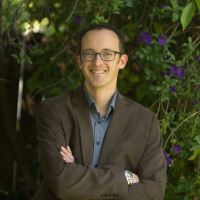Commentary on Romans 15:4-13
As was the case with Romans 13 last week, so also this week’s text from Romans 15 draws us into the double- or even triple-exposure of time that happens as the old year hands off to the new in the church calendar.
The beginning and the end come together as we enter the time of anticipation which will culminate with a backward-glancing celebration of the first arrival of the Messiah, and, one day, with the joyful reception of Christ at his second.
In between, we prepare. And, we strive to live as people of age-to-come. The conjunction of what God has done in the past, what God is doing among us now, and what God promises to do in the future come together to undergird the seminal Christian virtue of hope.
Scripture: Past, Present, and Future
Romans 15 is drawing to a close the lengthy argument of the letter that has unfolded since Romans 1:1. There we heard that scripture was the source of the promise about the coming Messiah. Here we learn why it is that Paul makes such a big deal out to scripture: “whatever was written in former days was written for our instruction, so that by steadfastness and by the encouragement of the scriptures we might have hope” (Romans 15:4, NRSV).
Hope is the present state of anticipating a particular future of which we can be confident because of what scripture has said to us in the past. But more than that, we can be confident because what scripture said in the past has also already begun to come true. The gospel of God’s son, the pre-promised Messiah, has come (Romans 1:1-2).
Scripture is reliable because God is reliable. That’s why Paul shifts from applying “steadfastness and encouragement” to scripture in Romans 15:4 to calling God the source of “steadfastness and encouragement” in Romans 15:5.
In Advent, we can anticipate the still-awaited advent of Jesus with firm hope because God has already brought to pass the first-awaited advent of the Christ. We are not simply preparing to celebrate Christmas; we are preparing to be those who are ready when Christ returns according to the promise of God. This means being the people of hope.
Becoming a Mirror of Christ
Romans 15 shows us that it takes the whole community working together to show itself to be a reflection of Christ. What does a Jesus-like body of Christ look like here on earth?
It looks like people whom the world would separate into different tribes rejecting those boundaries, gathering under the same roof, and mixing the voices that the world would keep separate in songs of praise to God. We show that we live in harmony by singing in harmony.
And that can only be done when we are sitting in the same room.
In a recent episode of On Being, civil rights legend Ruby Sales commented that a crying need for theology, right now, is “to create a beloved, global community.” One of the tragedies of the history of Christianity has been the ways that we have occluded Paul’s breathtaking command, “Welcome one another, as Christ has welcomed you.”
We falter every time we redefine “welcome” such that people are only allowed halfway in the door (you can be here but you can’t join, you can join but you can’t lead, you can lead but you can’t preach). We falter every time we redefine “one another” such that it really only means people like us (“We’d love to have black people in here singing our white church songs!”) We falter every time we fail to extend our welcome of others on the same basis as Christ’s welcome of us: anytime we demand that another enact self-sacrificial love rather than loving sacrificially ourselves so that the formerly excluded can now be embraced (“Any gay person willing to act like a celibate straight white person is welcome here!”).
We are at a time in our country’s life in which tribalism is pulling us apart at the seams. Façades of unity are crumbling, revealing underlying contention and strife. This is so in national politics as much as it’s true in church culture and politics.
Romans 15 is telling us that the light of Advent will only fully shine on the world when the church becomes a people who better reflect the story of radical hospitality — the story of Jesus during his time on earth, the story of the Christ who has accepted all into the presence of God.
Hope in the Rejoicing Nations
Paul depicts a litany of biblical passages prophesying that the Gentiles must join their praises to the people of Israel (Rom 15:10-12). We must remember that the division between Jew and Gentile was established in scripture. It has deep theological significance and can claim direct divine origin. And yet, the manifestation of God’s gracious arrival is not the celebration of the Jews, but the celebration of the Jews and Gentiles together.
It is oftentimes easy to look at ourselves, our presence, our people, as enough. We have scripture, we are living out the story, we are hoping for the future. Yes, these are good markers. But “we” must never think that “we” are complete. There are more of us.
As this text interrogates us, it flips the script, telling us that we are now those who have been insiders for millennia. We are the ones who have the power to tell others that they are or are not welcome. But here is the paradox: the more we relegate the gospel to people like ourselves, the weaker grows our hope and the dimmer grows our Advent light.
Because it is only in the gospel surprise of the one who does not look like me, sitting next to me singing praises to God, that I know the scripture to be fulfilled, as Isaiah says, “There will come the root of Jesse (Romans 1:3), and he who arises to rule the Gentiles (Romans 1:4) in him will the Gentiles hope (Romans 1:5).” This is the picture of Advent we must paint by creating diverse communities of praise.


December 4, 2016